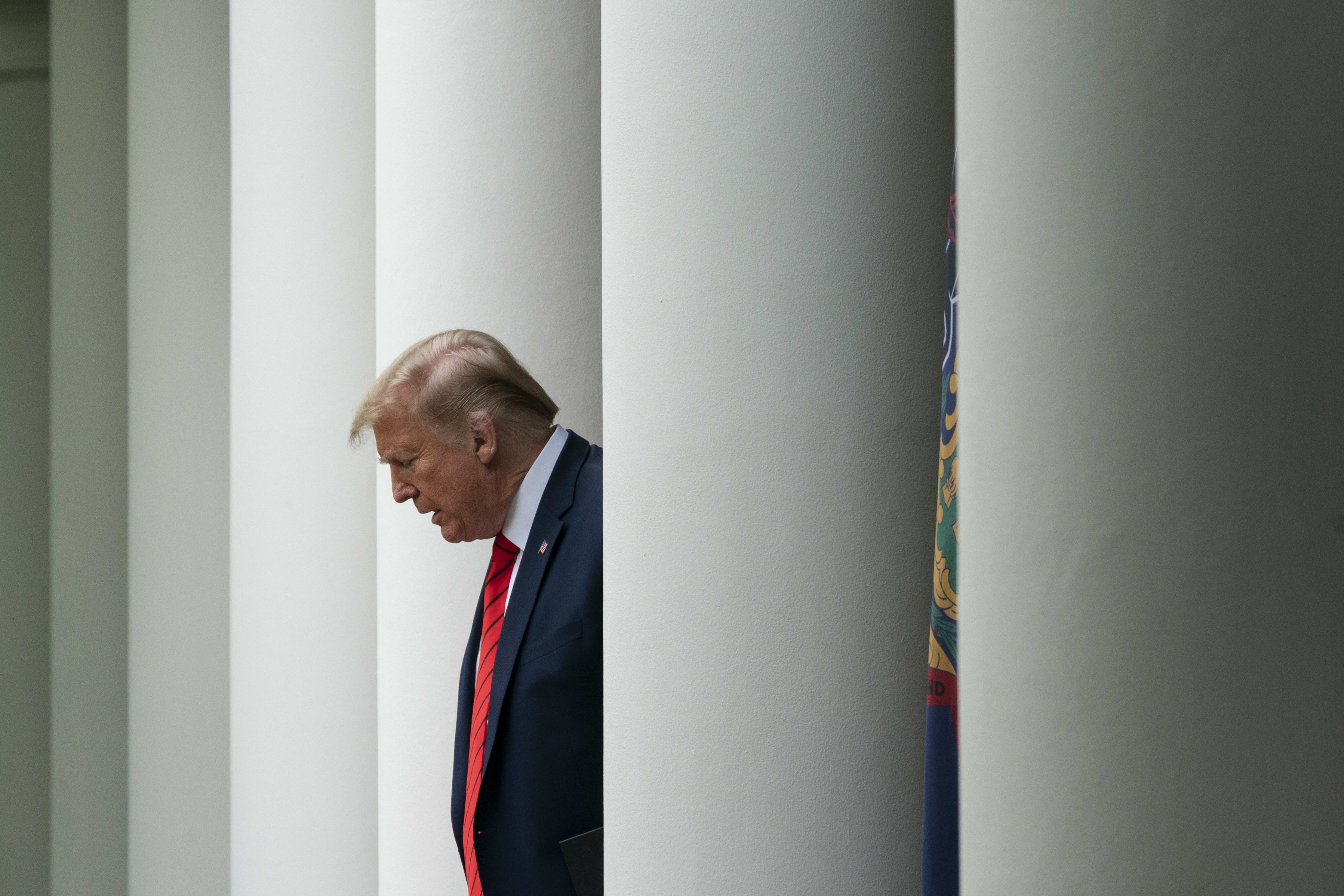
U.S. President Donald Trump arrives to speak at a press briefing about coronavirus testing in the Rose Garden of the White House on May 11, 2020 in Washington, DC.
Drew Angerer | Getty Images
WASHINGTON — The Trump administration said Thursday that it will withdraw from another major international treaty, a decision expected to disturb European allies as Washington pulls back further from global arms commitments and other pacts.
The Open Skies treaty allows 35 nations, including Russia, to conduct unarmed surveillance flights over each other’s territory in order to assure that nations are not preparing for military action.
The Trump administration has previously said that Russia has repeatedly violated the terms of the pact, which was brokered three decades ago. Washington maintains that Moscow uses the flights as an opportunity to identify critical infrastructure to target during a potential conflict.
“President Trump has made clear that the United States will not remain a party to international agreements that are being violated by the other parties and are no longer in America’s interests,” said national security advisor Robert O’Brien in an emailed statement.
“We look forward to negotiating with both Russia and China on a new arms control framework that moves beyond the Cold War constructs of the past and helps keep the entire world safe,” the statement added.
Secretary of State Mike Pompeo wrote in a statement that the United States may reconsider its withdrawal should Russia return to full compliance with the treaty.
“This is not a story exclusive to just the Treaty on Open Skies, unfortunately, for Russia has been a serial violator of many of its arms control obligations and commitments,” Pompeo added.
Pentagon spokesman Johnathan Hoffman told reporters Thursday that Russia “implements the treaty in ways that contribute to military threats against the United States and our allies and partners.”
“We’ve been clear on these concerns for years, and to your question, the Secretary has had conversations with his allies and partners about these concerns previously,” he added.
U.S. President Donald Trump and Russia’s President Vladimir Putin are seen during the G20 leaders summit in Buenos Aires, Argentina November 30, 2018.
Marcos Brindicci | Reuters
On the heels of the withdrawal announcement, Russia’s permanent mission to NATO wrote in a statement that the Open Skies treaty is “crucial for ensuring mutual trust in Europe and on a larger scale.”
“If it does happen, it will be very regrettable. Unfortunately, it goes with general policy of current U.S. administration to derail all arms control agreements,” the statement added.
The formal withdrawal from the treaty will take place in six months, according to the pact’s terms.
Supporters of the agreement, which was initially proposed by President Dwight Eisenhower in 1955, say that a U.S. departure may embolden Russia.
“U.S. withdrawal would prevent the United States from overflying Russia but would leave Russia still able to overfly American military activities and installations in Europe. U.S. departure would also further weaken the international arms control architecture and be a further blow to any global sense of stability,” senior military and defense officials from across Europe wrote in a joint statement.
The latest revelation may foreshadow a departure from the sole major arms treaty remaining with Russia. The New Strategic Arms Reduction Treaty, or New START, limits the number of deployed nuclear missiles in U.S. and Russian arsenals to 1,550. The agreement is slated to expire a few weeks after the next presidential inauguration. The president will have until February 2021 to extend the deal for up to five years.
A deactivated Titan II nuclear ICMB is seen in a silo at the Titan Missile Museum on May 12, 2015 in Green Valley, Arizona.
Brendan Smialowski | AFP | Getty Images
The withdrawal from the Open Skies treaty is the latest global pact with allies that the Trump administration has bailed on. Last year, Trump removed the United States from the Intermediate-range Nuclear Forces, or INF, Treaty with Russia, sparking concerns of a budding arms race between the world’s two biggest nuclear powers.
The INF treaty, signed in 1987 by President Ronald Reagan and Soviet leader Mikhail Gorbachev, prohibited the development and deployment of ground-launched nuclear missiles with ranges of 310 miles to 3,420 miles. The agreement forced each country to dismantle more than 2,500 projectiles, and kept nuclear-tipped cruise missiles off the European continent for three decades.
In 2018, Trump withdrew from the Joint Comprehensive Plan of Action, or JCPOA, a landmark nuclear deal brokered by the Obama administration.
The 2015 nuclear agreement lifted sanctions on Iran that crippled its economy and cut its oil exports roughly in half. In exchange for sanctions relief, Iran accepted limits on its nuclear program and allowed international inspectors into its facilities.
Much like its reasons for leaving the Open Skies agreement, the Trump administration has previously said that its decision to exit global commitments, like the INF and JCPOA, is because another party has violated the terms.

